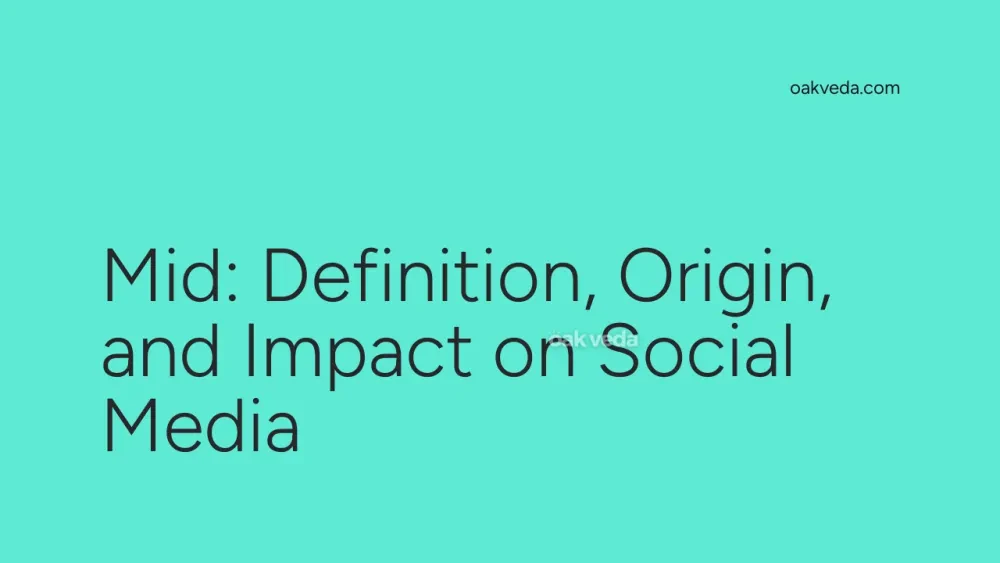
What is "Mid"?
"Mid" is a popular slang term used across various social media platforms, including Twitter, Instagram, and TikTok. It serves as a shorthand way to describe something as average, mediocre, or underwhelming. When someone refers to something as "mid," they're expressing a lack of enthusiasm or disappointment, often with a touch of humor or sarcasm.
Origin and Development of "Mid"
The term "mid" as slang is believed to have originated from African American Vernacular English (AAVE) and gained widespread popularity through social media platforms. While the exact origin is difficult to pinpoint, its usage as a descriptor for mediocrity became more prevalent in the late 2010s and early 2020s.
Initially, "mid" was primarily used in hip-hop and gaming communities. However, it quickly spread to mainstream social media usage, becoming a ubiquitous part of online vernacular.
How "Mid" Works in Social Media Context
On social media, "mid" is typically used in two ways:
- As an adjective: "That new album is so mid."
- As a noun: "The party was just mid."
In both cases, the term conveys a sense of disappointment or lack of impressiveness. It's often used to critique various aspects of popular culture, personal experiences, or products.
Popular Examples of "Mid" Usage
- "The finale of that TV show was mid at best."
- "I thought the concert would be amazing, but it was pretty mid."
- "This restaurant's food is mid. Let's try somewhere else next time."
Impact of "Mid" on Social Media Culture
The popularity of "mid" reflects a broader trend in social media culture towards quick, punchy expressions of opinion. It allows users to convey complex feelings of disappointment or mediocrity in a single, easily digestible word.
This term has also contributed to a culture of heightened criticism on social media. With "mid" at their disposal, users can quickly dismiss or critique anything they find unimpressive, potentially influencing public opinion on various topics.
Controversies Surrounding "Mid"
While "mid" is widely used, it's not without controversy. Some argue that the term oversimplifies criticism and encourages a culture of negativity. Others point out that overuse of such slang terms can lead to a degradation of language and communication skills.
There's also debate about the appropriation of AAVE terms like "mid" by non-Black internet users, raising questions about cultural sensitivity and linguistic ownership in the digital age.
How Brands and Influencers Use "Mid"
Despite its negative connotations, some brands and influencers have embraced "mid" in their social media strategies:
- Self-deprecating humor: Brands might playfully describe their own products as "not mid" to emphasize quality.
- Engagement bait: Influencers might ask followers to rate things as "mid" or "not mid" to boost engagement.
- Authenticity: Some use the term to appear more relatable and in touch with current internet culture.
Future Trends Related to "Mid"
As with many internet slang terms, the future of "mid" is uncertain. While it currently enjoys widespread usage, the rapid evolution of internet language means it could either:
- Become a lasting part of online vernacular
- Fade out of popularity as new slang terms emerge
- Evolve in meaning or usage over time
Regardless of its longevity, "mid" has already left its mark on social media communication styles and critique culture.
FAQs about "Mid"
-
Is "mid" always negative? While generally used to describe something as average or underwhelming, the context can sometimes make it less negative. For example, saying something is "not mid" is a compliment.
-
Can "mid" be used for people? While it's possible, using "mid" to describe people is often considered rude or offensive. It's primarily used for experiences, products, or content.
-
Is "mid" used outside of social media? While it originated and is most common on social media, "mid" has begun to appear in casual spoken language, especially among younger generations.
-
Are there alternatives to "mid"? Yes, terms like "meh," "so-so," or "mediocre" convey similar meanings but may lack the specific cultural connotations of "mid."
-
How can I use "mid" appropriately? If you choose to use "mid," be aware of its potential negative impact. Use it sparingly and avoid applying it to sensitive topics or directly to individuals.
In conclusion, "mid" has become a significant part of social media lexicon, offering users a concise way to express disappointment or mediocrity. While its usage can be controversial, understanding this term is crucial for navigating modern online conversations and culture. As with all slang, use it wisely and be aware of its potential impact on your communication and relationships in the digital sphere.
You may be interested in:
- Macro-Influencer: Definition, Origin, and Impact
- Reply Guy: Definition, Origin, and Impact on Social Media
- Hot Girl Walk: Definition, Origin, and Impact
- Shorby: Definition, Origin, and Impact on Social Media Marketing
- PSA (Public Service Announcement): Definition, Origin, and Impact
- "It's Giving": Definition, Origin, and Impact

